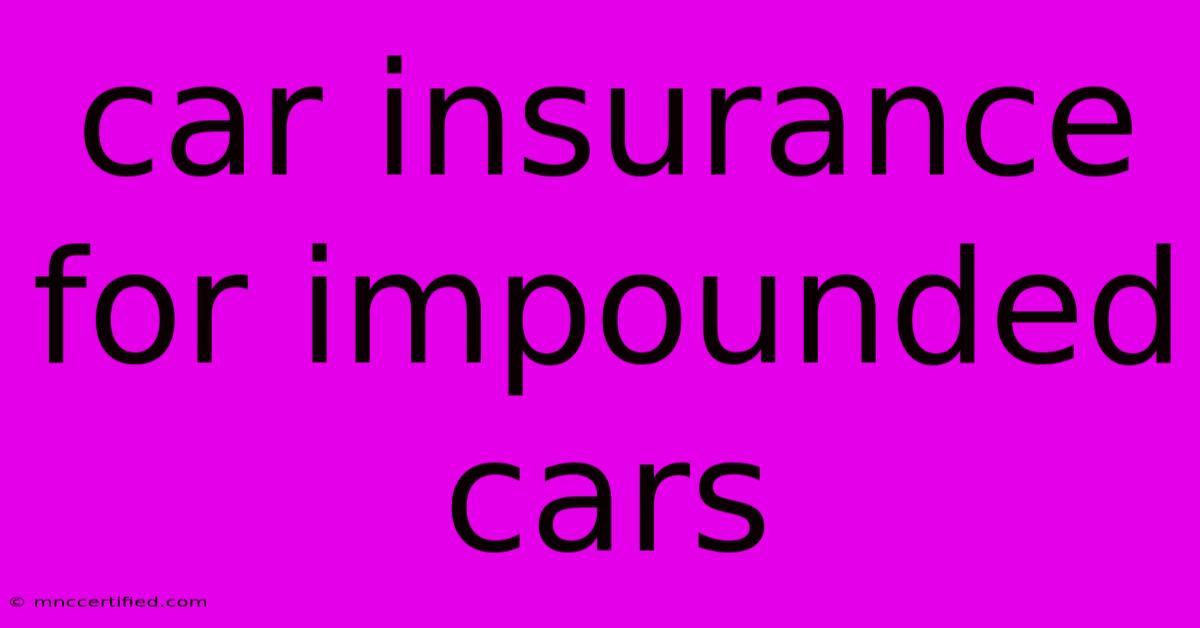Car Insurance For Impounded Cars

Table of Contents
Car Insurance for Impounded Cars: What You Need to Know
Getting your car impounded is a stressful experience, made even more complicated by insurance questions. Many wonder: Do I still need car insurance on an impounded car? The short answer is: it depends. This article will break down the complexities of car insurance and impound situations to help you navigate this challenging time.
Do I Need Insurance on an Impounded Car?
The need for insurance while your car is impounded hinges on several factors, primarily the reason for impoundment and your specific insurance policy.
Reasons for Impoundment:
-
Violation of Parking Regulations: If your car was towed for a simple parking violation, your insurance likely remains valid. You’re still responsible for the premiums, and your coverage continues to protect you against potential liabilities (though the car itself is unavailable).
-
Accident Involvement: If your car was impounded following an accident, your insurance coverage will play a crucial role in the claims process. Your insurer will investigate the incident, and depending on who was at fault, your coverage may help cover damages, repairs (once the car is released), or medical expenses. Liability coverage is especially important in these cases.
-
Illegal Activity: If your car was impounded due to illegal activity such as drug trafficking or DUI, your insurance company might investigate and potentially cancel your policy. This is due to breach of contract, as most policies exclude coverage for illegal activities. Contact your insurer immediately to understand the implications.
-
Failure to Pay: If the impoundment resulted from unpaid parking tickets or other debts, your insurance coverage should remain unaffected. However, you will need to resolve these debts before retrieving your vehicle.
Checking Your Policy:
Regardless of the reason for impoundment, review your insurance policy thoroughly. Look for clauses about coverage while the vehicle is in storage or unavailable. Some policies may have specific wording regarding impoundment situations. Contact your insurer directly if you have any questions or uncertainties. It’s better to be safe than sorry.
Insurance Costs While Impounded:
You will still be responsible for paying your insurance premiums while your car is impounded. The impoundment itself doesn't usually excuse you from these payments. Failure to pay premiums could lead to policy cancellation, affecting your future ability to obtain insurance.
Getting Your Car Back: Insurance and Release
Once you’re ready to retrieve your impounded vehicle, you may face various fees. These fees are unrelated to your insurance policy but are a necessary cost to reclaim your car. Your insurance will not cover these impound fees. These fees usually include:
- Towing fees: The cost of towing your car to the impound lot.
- Storage fees: Daily or weekly charges for keeping your car in the impound lot.
- Administrative fees: Fees charged by the authorities for processing the impoundment.
Remember to obtain all necessary documentation from the impound lot before leaving. This includes receipts for all paid fees and any release forms. This paperwork is crucial if you are making an insurance claim related to the impoundment.
Preventing Impoundment:
The best way to avoid the complexities of car insurance and impoundment is to avoid getting your car impounded in the first place! This involves:
- Responsible Parking: Always park legally and ensure you understand local parking regulations.
- Safe Driving: Adhere to traffic laws to avoid accidents and citations.
- Vehicle Maintenance: Keeping your vehicle in good working order can prevent breakdowns that might lead to impoundment.
Conclusion:
Navigating car insurance while your car is impounded requires careful attention to detail. Understanding the reasons for impoundment and carefully reviewing your insurance policy are crucial steps. Direct communication with your insurer is always recommended to clarify any ambiguities and ensure you’re adequately covered. Proactive driving and parking habits are the best way to prevent impoundment altogether.

Thank you for visiting our website wich cover about Car Insurance For Impounded Cars. We hope the information provided has been useful to you. Feel free to contact us if you have any questions or need further assistance. See you next time and dont miss to bookmark.
Featured Posts
-
Shelter Insurance Chillicothe Mo
Nov 22, 2024
-
Cheapest Sr22 Insurance In Maine
Nov 22, 2024
-
Strictlys Jowita Swaps Partners
Nov 22, 2024
-
Icc And Israeli Prime Minister Arrest
Nov 22, 2024
-
E Coli Contamination Beef Product Recall
Nov 22, 2024